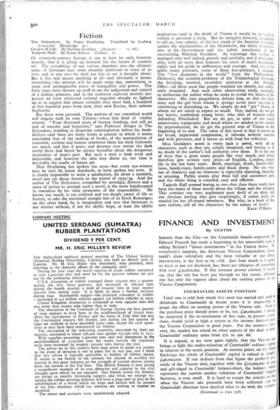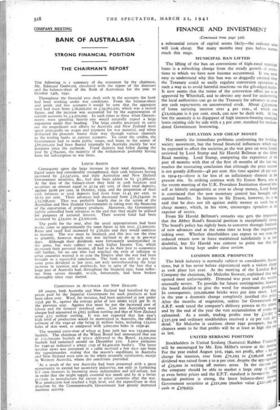FINANCE AND INVESTMENT
By CUSTOS
SOONER than the City—or the Courtaulds board—expected, Sir Edward Peacock has made a beginning in his unenviable task of selling Britain's "direct investments " in the United States. To everybody's surprise, the American Viscose Corporation, Cour- tauld's giant subsidiary and the most valuable of our direct investments, is the first to be sold. Just how much it is going to fetch is not yet disclosed, but there are whispers of something well over L3o,000,000. If this forecast proves correct, I should say that the sale has been put through on fair terms, although one has only the vaguest ideas about the earning power of the Viscose Corporation.
COURTAULDS ASSETS POSITION
Until one is told how much this asset has earned. and paid to dividends to Courtaulds • in recent years it is impossible to gauge the effect on earning power of the Viscose sale. Even if the purchase price should prove to be, say, £ 40 ,000 poo , I should be surprised if the re-investment of this sum,• in present condi' tions, would yield as high a return as the income derived from the Viscose Corporation in good years. For the moment, how- ever, the market has seized on other aspects of the deal to hoist Courtaulds' ordinary units from 27s. to 3os., 6d.
It is argued, in my view quite rightly, that the Viscose
brings to light the under-valuation of Courtaulds' ordinary oartal in relation to the assets position. At current prides on the Stock Exchange the whole of Courtaulds' capital" is valued at rougllIF L46,000,000. If one deducts from that figure the -probable pro. ceeds of the Viscose deal, together with the £12,000,000 of Gish and gilt-edged in Courtaulds' balance-sheet, the balance. which represents the current market valuation of 'Courtaulds' English business, is -very small. It is hard to escape the conclusion dui when the Viscose sale proceeds have been collected and the Courtaulds'.directors have decided what to do with the mover - (Continued on page 328) .
FINANCE AND INVESTMENT
(Continued from page 326) a substantial return of capital seems likely—the ordinary uniti will look cheap. But many months may pass before matters reach this stage.
MUNICIPAL BAN LIFTED
The lifting of the ban on conversions of high-rated municipal loans is a refreshing change from the steady growth of restric- tions to which we have now become accustomed. It was neva easy to understand why this ban was so doggedly ietained when the Treasury could so easily regulate conversion operations in such a way as to avoid harmful reactions on the gilt-edged market. It now seems that the terms of the conversion offers are to Ix approved by Whitehall, and to obviate any need for underwriting the local authorities can go to the Treasury for advances to cover any cash repayment's on unconverted stock. About £32,coo,ozo of loans carrying interest over 4 per cent., of which ova k12,000,000 is 6 per cent. stock, can now be dealt with. At long last the anomaly is to di§appear of high interest-bearing municipal loans existing side by side with a 3 per cent. standard for medium. dated Government borrowing.
INFLATION AND CHEAP MONEY Not merely the immediate problems confronting the bidding- society movement, but the broad financial influences which may be expected to affect the societies_as the war goes on were frankly reviewed by Lord Stamp and Sir Harold Bel man at the Abbey Road meeting. Lord Stamp, comparing the experience of the past i8 months with that of the first 18 months of the last war, reaches the reassuring conclusion that although the price increase is not greatly different-48 per cent. this time against 58 per cent in 1914-15—there is far less of an inflationary element in the present rise. In striking contrast with Sir Ernest Berm, who at the recent meeting of the U.K. Provident Institution showed him- self as bitterly antagonistic as ever to cheap money, Lord Stamp is convinced that the new monetary control has brought sub- stantial benefits. In fairness to Sir Ernest, however, let it be said that he does not tilt against stable money as such but at cheap money, which, in his view, encourages spenders at the expense of savers.
From Sir Harold Bellman's remarks one gets the impressica that the Abbey Road's financial position is exceptionally strong. The board's policy has rightly been to conserve through limitation of new advances and at the same time to keep the organisation ticking over. Whether shareholders can expect to see even the reduced return now in force maintained indefinitely is at least doubtful, but Sir Harold was content to point out that this situation is being kept under close review.
LONDON BRICK PROSPECTS
The brick induitry is normally subject to considerable fluctua- tions, but it has never before experienced such a violent clung as took place last year. At the meeting of the London Britt Company the chairman, Sir Malcolm Stewart, explained that 194' opened most unfavourably. Demand was poor and the weather unusually severe. To provide for future contingencies, however, the board decided to give the word for maximum production In consequence, 250,000,000 bricks were put into stock. Later in the year a dramatic change completely justified this policF. After the months of stagnation, orders for Government and A.R.P. work taxed the company's delivery powers to the 0064 and by the end of the year the vast accumulation of stocks was exhausted. As a result, trading profits rose by £21,827 to £337,3,19 and ordinary stockholders received a to per cent. dis4 dend. Sir Malcolm is cautious about 1941 prospects, but the chances seem to be that profits will be at least as high this Yelr as last.
UNITED SERDANG POSITION
Stockholders in United Serdang (Sumatra) Rubber Plantati° will be encouraged by Mr. Eric Miller's review at the trod* For the year ended August 31st, 1940, net profit, after a head charge for taxation, rose from £71,193 to £156,108 andbe dividend was raised from 5 to 9 per cent. despite the approPri": of £25,000 in writing off mature areas. In the current FP' the company should be able to market a large crop of 110 at even better prices and the E.P.T. standard is favourable. 11$ financial position is strong, the latest balance-sheet shol Government securities at £221,000 (market value L228,568) PI cash at £379,933.







































 Previous page
Previous page